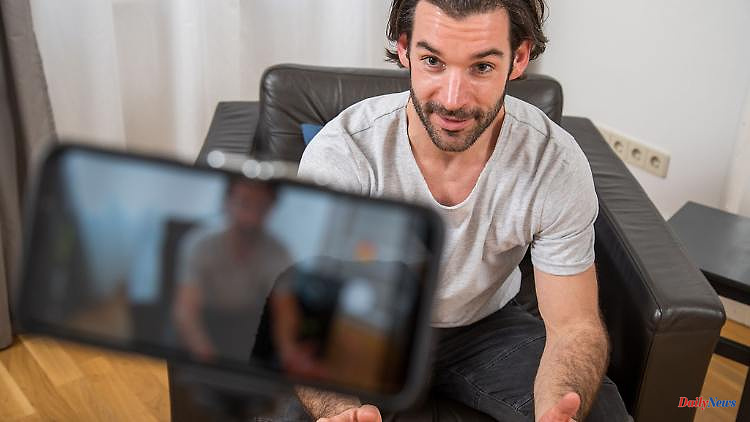Stock tips on YouTube, crypto gurus on Instagram: In social media, financial influencers promise quick returns. You can learn a lot from some bloggers, but only lose a lot from others.
If you want to gain reach with financial tips in social media, you have two options. First: The videos on Tiktok, Youtube or Instagram should appear highly serious.
Then young women in blazers and blouses sit in empty offices and give lectures on the opportunities for battery shares. Smart sayings from investment bankers or stock exchange gurus are often quoted - after all, they know their stuff, so the message.
The second possibility: Your own investment success is made visible. True to the motto "My house, my pool, my grill", self-proclaimed experts announce their stock market wisdom from the garden lounger. In the background, the wind gently moves the fronds of a palm tree.
So-called finfluencers have experienced a real boom in recent years, as an analysis by Hypeauditor found. The agency analyzes influencer marketing. The area of economics and finance recorded the greatest growth in Germany. Young users like to find out more about investments on social media. A study by the direct bank Comdirect suggested something similar a few years ago.
It is no coincidence that this growth coincided with a veritable stock boom. Since 2020, young people in particular have discovered the stock exchanges for themselves. And they rarely read printed guidebooks, instead looking for information on the internet.
Annabel Oelmann, head of the consumer advice center in Bremen, considers reputable influencers to be a good addition to research, precisely because they reach the young target group. Talking about money is important.
But she also urges caution and awareness of the rapid accessibility of social media: "Anyone with a social media profile can often bring this type of advice to the public unfiltered - regardless of how much they actually know or how serious their tips are are."
The basics of investing can be easily conveyed on YouTube or Instagram. How a depot is opened, what returns mean and how stock trading works - all of this can be read in blog posts or watched in simple videos. Anyone who has never heard of ETF, wants to understand cryptocurrencies (a little) or is interested in diversification strategies will find reputable financial influencers who prepare such topics in a simple and meaningful way.
But not all are serious, warns the German financial regulator Bafin. Not everyone is sufficiently familiar with financial issues, and for some the motivation is dishonest. Marc Tüngler, general manager of the German Association for the Protection of Securities, hears more and more about them. The phenomenon is not new, self-proclaimed financial experts have always attracted investors.
"In bad stock market phases, their promises are particularly good. If the portfolio is in the red, some investors hope for the hot tip and no longer trust their own decisions," says Tüngler. In social networks in particular, some consumers find it difficult to maintain the necessary distance from influencers.
A background check can help determine who is credible. Who is that giving advice? How much was the person involved with finance before? Why does he or she recommend this? What are the interests? Do I have to pay anything for this? Users should ask themselves these questions.
You'd also be better off following multiple influencers at once to get a wide range of opinions. "You always have to be vigilant and remain critical," said Tüngler. He recommends becoming suspicious the more specific the tip becomes. A specific stock, a specific cryptocurrency - and nobody else knows this insider tip! That should set alarm bells ringing.
Oelmann advises paying attention to your gut feeling. You should also read the disclaimer carefully. "Often at the end of the video it says that this is not advice, a recommendation or anything else and that no liability is assumed. Accordingly, I would also rate the video as a kind of field report or financial diary and nothing more." The consumer advocate recommends independent fee-based advice in particular when advertising is made for certain products or providers.
What started as a hobby for some influencers can develop into a full-time job. If you have enough reach, you can earn a lot of money with advertising. Some also sell books or offer paid seminars.
In principle, this is not objectionable. But Tüngler warns: "For some, it really tips over when the community is big enough. There's interest away from information towards making money." Anyone who follows influencers should therefore always question their motivation.












